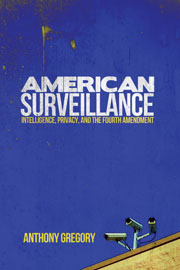The Democratic leadership and virtually all Congressional Republicans approved the law. In a complete reversal of his campaign promise, so did Senator Barack Obama. Last October, his campaign announced, “To be clear: Barack will support a filibuster of any bill that includes retroactive immunity for telecommunications companies.” Instead, he voted to prevent a filibuster and then he voted for the bill.
Democrats and Obama supporters defend the betrayal with hollow claims that the law actually protects civil liberties. Why then was Bush so eager to sign it? Missouri Republican Senator Christopher Bond, a leader in this “compromise,” says “the White House got a better deal than even they had hoped.”
Two years ago, the Democrats seemed outraged after we learned Bush had ordered the National Security Agency— a military outfit—to spy on Americans without warrants, in violation of the Foreign Intelligence Surveillance Act. Now they control Congress with good odds at the presidency. Power and the hope for more power corrupt.
As Salon.com civil liberties expert Glenn Greenwald notes, “in 2006, when the Congress was controlled by [Republicans], the administration tried to get a bill passed legalizing warrantless eavesdropping and telecom amnesty, but was unable. They had to wait until the Congress was controlled by [Democrats] Steny Hoyer, Nancy Pelosi and Harry Reid to accomplish that.”
Both parties have long been at war with the Fourth Amendment.
In 1978, after the Senate’s Church Committee reported decades of intelligence abuses, President Carter signed FISA to regulate foreign surveillance. It created a secret court within the Justice Department with unpublished decisions that went on to grant warrants for every one out of thirteen thousand requests up until 9/11. FISA’s standards were already much lower than the Constitution’s.
Almost all Republicans and Democrats voted for the Patriot Act in 2001 to amend FISA more to Bush’s liking. Supposedly, FISA had obstructed investigations of such terror suspects as “twentieth hijacker” Zacarias Moussaoui. In reality, the FBI agents could have gotten a warrant for him had they understood the law.
In 2002, after the FISA court unanimously rejected the administration’s attempt to revamp it for law enforcement, the Justice Department, under John Ashcroft, successfully appealed to a special, secret FISA Appeals Court and got the new powers they wanted.
Despite all this capitulation to the administration, for years the NSA has been ignoring FISA altogether to wiretap calls within the United States. We do not know the extent of Bush’s extrajudicial surveillance. But in 2004, even John Ashcroft and other Justice Department officials considered his spying program illegal, refused to sign off on it, and threatened to resign over it, according to former Deputy Attorney General James Comey’s testimony at the Senate Judiciary Committee last year.
And now Obama and the Democratic leadership have approved the extrajudicial activity that even Ashcroft considered outrageously illegal.
This is no surprise, actually.
Democratic presidents since Wilson and FDR have long abused intelligence powers, spying on large groups of peaceful Americans and political opponents. Under Republicans like Eisenhower and Nixon, the abuses continued. Carter’s approval of FISA was itself an abandonment of the Fourth Amendment and Bill Clinton widened stealth surveillance of the citizenry far more than any president before him. Now Bush has set new precedents in extrajudicial spying and the Democrats give every indication the trend will continue.
Having broken his promise to oppose the new law, Obama now promises to “monitor the program closely” as president – but who will monitor him? The Fourth Amendment is supposed to protect us from an unchecked executive, no matter the president, no matter the party.
The Fourth Amendment offers little comfort and trust toward would-be rulers. No wonder the feeling is mutual.








